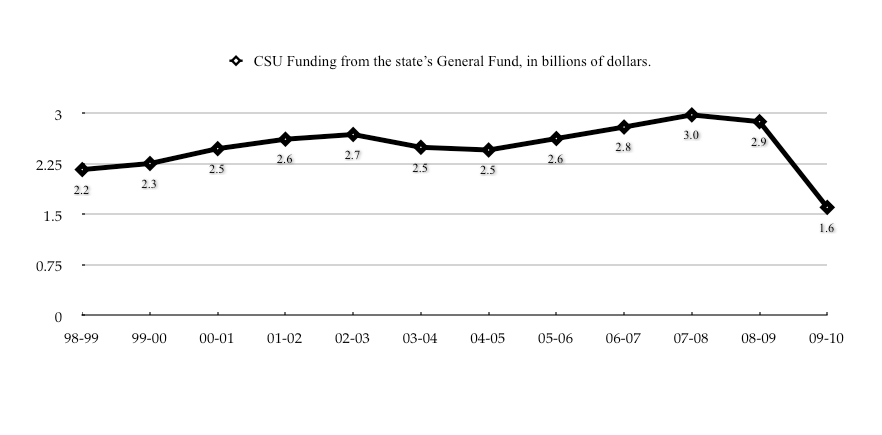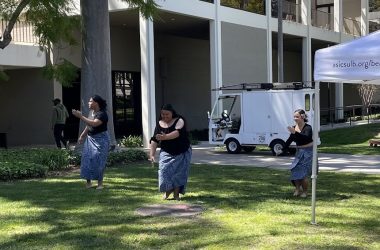Students at California State University campuses could pay 25 to 30 percent more for classes starting this fall as part of a solution to a half-billion dollar budget gap.
At a special meeting Tuesday of the CSU board of trustees, Chancellor Charles B. Reed said a projected $584 million deficit for the 2009-2010 school year was optimistic.
“I would say that that’s probably the best-case scenario,” Reed said.
Reed plans to ask the CSU’s trustees to increase student fees by 15 to 20 percent, in addition to the 10 percent increase approved in May, according to Erik Fallis, a spokesperson for the CSU.
The ongoing state budget crisis has CSU administrators scrambling to reduce the system’s general budget by roughly 20 percent. Reed and board members stressed that no option can be kept off the table, leaving the door open for layoffs, increased student fees and cancelation of some classes.
“We have no good choices whatsoever,” Reed said.
A standing-room only crowd gathered in the auditorium of the CSU chancellor’s office in Long Beach to hear Tuesday’s bleak assessment. Staff and faculty members representing nearly all of the CSU’s 23 campuses were present, and many criticized the CSU leadership during a public comment period.
“You are not doing your job,” said Jill Fields, a historian at Fresno State. Fields called for a complete audit of the administration at both the systemwide and individual campus levels.
The exact amount of money for the CSU system is not yet known because the state legislature and Gov. Arnold Schwarzenegger have not reached a deal to pass a budget for the 2009-2010 fiscal year. The state’s contribution to the state university system is expected to drop by more than $1 billion. Some of that money — around $640 million, according to current estimates — will be replaced by federal stimulus funds. The planned 10 percent increase in student tuition will also help, but the half-billion dollar gap is likely to remain.
Reed repeated his plea Tuesday for employee unions to embrace the concept of furloughs — mandatory days off without pay.
“We know that furloughs save jobs,” Reed said, though he admitted it would be a “nightmare” to organize and implement.
The CSU hopes to save $275 million by furloughing most staff and faculty members twice a month, but needs approval from employee unions before it can take action. Salaries and benefits for employees make up about 85 percent of expenditures, according to CSU officials.
At least one union, the California State University Employee Union has agreed to the plan, but other groups and individuals are wary of the idea. CSUEU represents about 16,000 staff members.
“If faculty and staff take furloughs, what will the sacrifice give to our students?” asked California Faculty Association President Lillian Taiz. The CFA wants administrators to guarantee that furloughs would prevent layoffs, but it’s a guarantee the CSU has been unwilling to make so far.
The CFA announced Wednesday that its members will be able to vote beginning July 13 on whether to take furloughs. Administrators are already anticipating layoffs for faculty and staff members.
Reed also announced that he would ask the presidents of all 23 campuses to cut spending. Individual cuts would be left to each campus, each responsible for a portion of the roughly $200 million in spending that administrators are seeking to eliminate systemwide.
Other cost-cutting measures in consideration include reducing enrollment, freezing salaries of administrators, restricting travel expenses and other purchases, and accelerating graduation rates.
The relationship between administrators and faculty union leaders has become strained as both face the possibility of layoffs and furloughs. In an open letter presented to the chancellor and trustees, the CFA called the leadership inflexible and self-interested.
At Tuesday’s meeting, the CFA also pressed board members to support two bills currently before the California Legislature. The first, Assembly Bill 656, introduced by Majority Leader Alberto Torrico, a Democrat from Fremont, would tax oil and natural gas extracted from California’s land and oceans to provide a new source of funding for the CSU and University of California systems.
The second bill, sponsored by Senator Leland Yee, a Democrat representing parts of San Francisco and San Mateo, would amend the California Public Records Act to include auxiliary organizations of publicly funded universities. The bill, Senate Bill 218, would force auxiliary organizations, such as CSULB’s Associated Students Inc. and Forty-Niner Shops Inc., to make financial information public.
The CFA’s support of SB 218 comes in the wake of several scandals involving academic foundations. Last week, the Santa Rosa Press Democrat reported that the academic foundation at Sonoma State University had made personal loans to a former board member who announced in May that he would be unable to repay all of his debts.
The state’s budget crisis is already affecting some students directly. Faced with a cash shortage, State Controller John Chiang began issuing IOUs to local governments, small businesses and taxpayers on July 2. Among those receiving the IOUs, officially known as registered warrants, are students receiving Cal Grants. CSU officials announced Wednesday that affected students will not have to pay student fees until the state pays out on the IOUs. Students receiving food and housing stipends as part of Cal Grant B awards will have to look to financial aid services at their respective campuses because the CSU does not have enough cash to cover the IOUs.
E-mail addresses are used only to notify you of replies and are not displayed
Comments powered by Disqus




